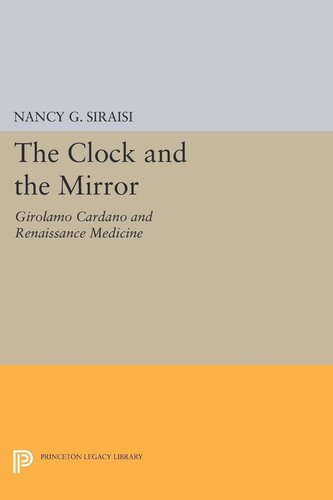

Most ebook files are in PDF format, so you can easily read them using various software such as Foxit Reader or directly on the Google Chrome browser.
Some ebook files are released by publishers in other formats such as .awz, .mobi, .epub, .fb2, etc. You may need to install specific software to read these formats on mobile/PC, such as Calibre.
Please read the tutorial at this link: https://ebookbell.com/faq
We offer FREE conversion to the popular formats you request; however, this may take some time. Therefore, right after payment, please email us, and we will try to provide the service as quickly as possible.
For some exceptional file formats or broken links (if any), please refrain from opening any disputes. Instead, email us first, and we will try to assist within a maximum of 6 hours.
EbookBell Team

4.8
104 reviewsGirolamo Cardano (1501-1576), renowned as a mathematician, encyclopedist, astrologer, and autobiographer, was by profession a medical practitioner. His copious writings on medicine reflect both the complexity and diversity of the Renaissance medical world and the breadth of his own interests. In this book, Nancy Siraisi draws on selected themes in Cardano's medical writings to explore in detail the relation between medicine and wider areas of Renaissance culture.
Cardano’s medical advice included the suggestion that "the studious man should always have at hand a clock and a mirror"—a clock to keep track of the passage of time and a mirror to observe the changing condition of his body. The remark, which recalls his astrological and autobiographical interests, is emblematic of the many connections between his medicine and his other pursuits. Cardano’s philosophical eclecticism, beliefs about occult forces in nature, theories about dreams, and free transitions between academic and popularizing scientific writing also contributed to his medicine. As a physician, he greeted two different types of medical innovation in his lifetime with equal enthusiasm: improved access to the Hippocratic corpus and Vesalian anatomy. Cardano presented himself as a practitioner with special gifts. Yet his medical learning remained rooted in the Galenic tradition that he often criticized. Meanwhile, he negotiated a career in a medical community characterized by personal and social rivalries, a competitive medical marketplace, and strong institutional and religious pressures.
Originally published in 2050.
The Princeton Legacy Library uses the latest print-on-demand technology to again make available previously out-of-print books from the distinguished backlist of Princeton University Press. These editions preserve the original texts of these important books while presenting them in durable paperback and hardcover editions. The goal of the Princeton Legacy Library is to vastly increase access to the rich scholarly heritage found in the thousands of books published by Princeton University Press since its founding in 1905.